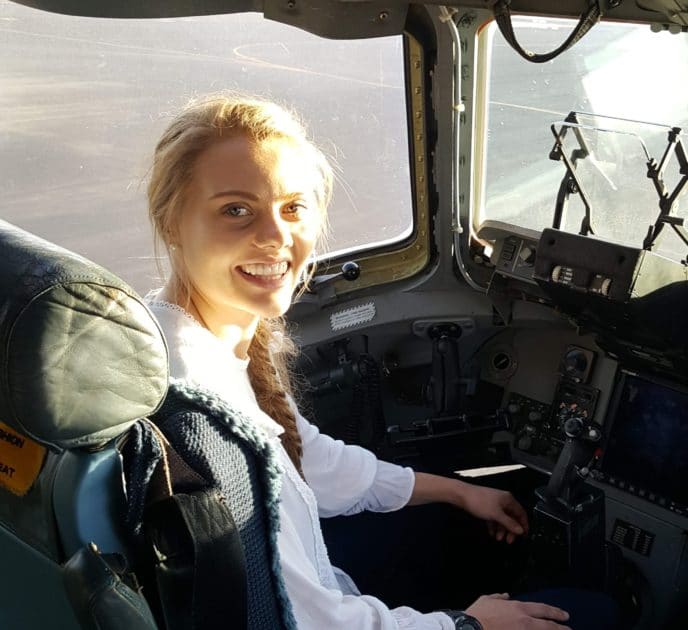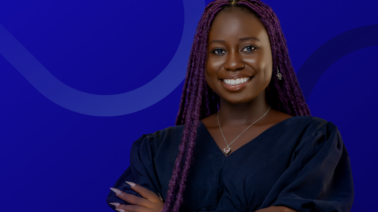 US Air Force Captain and Udacity grad Lindsey McEvoy, is a life-long learner and believes practical experience is key when learning anything. “You could read all you want, but applying what you’re learning is the most important,” says Lindsey.
US Air Force Captain and Udacity grad Lindsey McEvoy, is a life-long learner and believes practical experience is key when learning anything. “You could read all you want, but applying what you’re learning is the most important,” says Lindsey.
Lindsey works with the Department of the Air Force MIT Artificial Intelligence Accelerator in Cambridge, Mass.
Her primary focus there is the AI Enhanced Spectral Awareness and Interference Rejection project.
Read on to learn more about Lindsey’s learning journey with Udacity, and how she’s applying the skills she learned in the Data Analyst Nanodegree program.
Q: Tell us a bit about yourself and what you’re working on now.
Lindsey McEvoy: My name is Lindsey McEvoy and I’m an active duty Air Force Captain. My career field is Operations Research, but I’m currently working at the Department of the Air Force MIT Artificial Intelligence Accelerator in Cambridge, Mass.
I’ve been here since January of 2020. We started and then quickly had to figure out what we were doing in the age of COVID, which has been interesting and awesome to be a part of.
Q: What inspired you to start learning with Udacity? And how did you end up in your Nanodegree program?
LM: I was given the opportunity to take part in the Data Analyst Nanodegree program and I jumped on it right away. I love learning. I have my degree in operations research, both a bachelor’s and a master’s and I always love learning more and more.
I was really excited to have the opportunity to be a part of the Udacity program because I work with a team of researchers from the MIT campus and Lincoln Laboratory and they’re super smart. I just wanted to be able to be a bigger help to them, have more knowledge to provide them with and re-up my skills in a sense. I have these degrees, but I haven’t been practicing so I needed more practical experience.
Q: Has your role changed since you’ve taken your Nanodegree program?
LM: Not necessarily. I’m active duty Air Force on this project. The main project that I work on is called the AI Enhanced Spectral Awareness and Interference Rejection project.
The project ties into my background in F35 test and evaluation for electronic warfare systems. I’m still working on that project. I guess I’ve just been a little more help now, technically. But also, I’ll continue on that project for about the next two years.
Q: Can you give me an example of a time you’ve been able to apply the new skills you’ve learned in your Nanodegree program in your role?
LM: Sure. For the project, I was able to provide descriptive statistics or visualizations that helped better describe what we were doing and the impact that we were making.
And, I also helped with defining data architectures to make assessing, cleaning, gathering, wrangling and analyzing data easier in the future.
Q: What would you say the highlight of your Udacity learning journey has been?
LM: I really liked the projects. It was really interesting to test the knowledge that we would learn through the videos, the teacher and classes. It was really nice to do the projects, learn a new skill, apply that new skill and then figure out how I can use this knowledge in similar problems I face in the future. I think I’m more of a hands-on learner.
Q: Has taking a Nanodegree program changed your perspective on learning at all?
LM: I now realize how important the practical assessments and reinforcing what you learn are. You could read all you want, but applying what you’re learning is the most important, at least for me. And that definitely changed my perspective. I need to do those practical assessments and put my skills to the test and not just listen to the courses, but also apply the knowledge that I’ve been learning.
Q: What’s next for you?
LM: For the next two years, I’ll be on this project — the AI Enhanced Special Awareness Interference Rejection project. I may have more of a practical role and I may be able to do more evaluation as our project progresses. I may have a different role inside that project that may be more technical.
And then from there, wherever the Air Force sends me. I’m not sure yet what I’ll be doing after this assignment and this project, but probably something in the operations research field.
Q: What advice would you give those who are considering taking a Nanodegree, but haven’t taken the leap yet?
LM: I would say just try it out. There’s a lot to learn. There’s many different programs to match whatever you’re interested in. I also liked how flexible the program was. And the program is totally doable while working a full time job.
It was actually enjoyable and fun to spend my weekends going through the classes or the coding assignments, as nerdy as that sounds. It’s challenging, can be done while working and it’s fun.
I really enjoyed how flexible the Udacity program is. I did end up breaking my elbow in the middle of the program and having to get surgery. And so it was really nice to be able to put it off to the side for a little bit and easily pick it back up when I was able to get back into the program. I would encourage anybody to just give it a try if they’re interested.
Ready to take the leap yourself? Get the skills you need for a tech career you’ll love. Start creating data-driven solutions today with the Data Analyst Nanodegree program.



